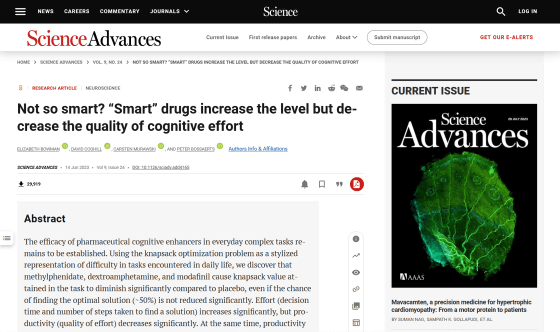Research results that 'smart drugs', which are said to improve cognitive ability, impair the ability to solve complex tasks

In recent years, among people such as students who are forced to study a lot, workers who work in a highly competitive environment such as the financial industry, and entrepreneurs in Silicon Valley, '
Not so smart? “Smart” drugs increase the level but decrease the quality of cognitive effort | Science Advances
https://doi.org/10.1126/sciadv.add4165

'Smart drugs' make you worse at solving complex problems, new study finds
https://theconversation.com/smart-drugs-make-you-worse-at-solving-complex-problems-new-study-finds-207711
Some ADHD and narcolepsy drugs are popular among students and workers as ``smart drugs,'' and users say they ``make their minds clearer, improve their cognitive abilities, and be more productive than usual. ” has been reported. However, the scientific impact on how these drugs work in people without disabilities or diseases is not well understood.
Therefore, the research team conducted an experiment to examine the effects of methylphenidate, modafinil , and dextroamphetamine, which are commonly used as smart drugs. These drugs mainly have effects such as increasing the amount of dopamine , a neurotransmitter in the brain, and are said to bring about changes in attention, motivation, alertness, etc.

The knapsack problem is a task to pack items with various weights and values into a knapsack , where the maximum weight of luggage is determined, and maximize the total value of the items within the range of weight that fits in the knapsack. This can be thought of as the embodiment of a task widely seen in the real world, ``maximizing value under certain constraints''.
The research team recruited 40 subjects aged 18 to 35 without ADHD and had them participate in four test sessions over four weeks. During each session, subjects took either methylphenidate, modafinil, dextroamphetamine, or a placebo and completed a variety of knapsack problems with eight variations and five difficulty levels. Subjects were given up to 4 minutes of thinking time for each problem, and submitted their answers at the timing when they thought the value of the item was the highest.

The results showed that subjects who took one of the three treatments, rather than placebo, took longer to complete the knapsack problem and were more likely to fail to find the optimal combination. In other words, it was suggested that taking smart drugs worsened both the time spent on tasks and performance, leading to lower productivity.
In addition, looking at individual performance, we also found that those who performed above average in the placebo session were more likely to perform worse on the smart drug.
'For people without ADHD, especially those who are already high performers, taking these drugs to gain an edge at work or school can have unintended consequences,' the researchers said. is complex and there are no shortcuts to improve it.'

Related Posts:
in Science, Posted by log1h_ik







